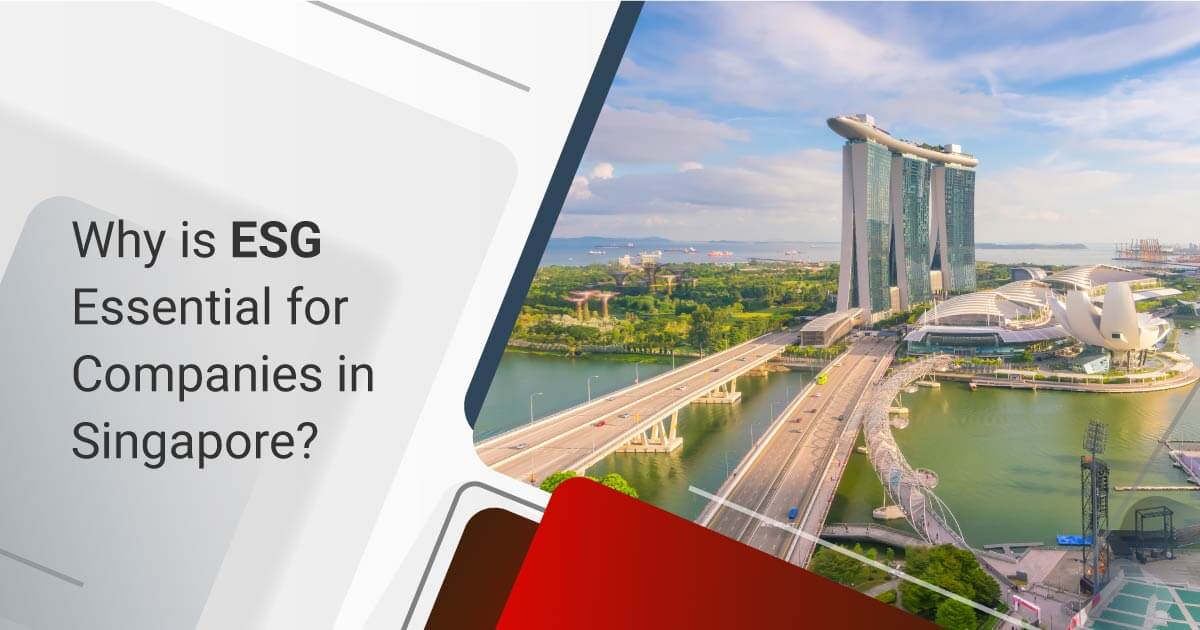Inside This Article:
Today, the world must recognise the growing importance of implementing environmental, social, and governance (ESG) practices. Governments worldwide see the urgency of addressing climate risk by committing to net zero targets, such as the Singapore government’s Green Plan 2030.
It also spells urgency for businesses – with stakeholders, including investors, consumers, and regulatory bodies, demanding greater transparency and accountability regarding environmental impact.
By actively managing their carbon footprint and implementing sustainable practices, businesses can align themselves with stakeholder expectations, bolster their reputation, and secure a competitive advantage in the market.
In this blog, we take a closer look at why ESG has become so important for companies to adopt.
Better Bottom Line
Companies that successfully implement a comprehensive ESG strategy have been found to perform better than their competitors on various profit metrics.
This may be attributed to several factors, such as the growing influence that ESG factors have on consumers’ purchasing decisions. This influence has allowed green companies to have greater pricing premiums on the products and services that they offer.
Apart from pricing premiums, they also enjoy greater customer loyalty and brand affiliation. Focusing on sustainability also drives companies to adopt operational efficiencies to support profitability, whether it is by improving supply chains, encouraging innovation, or through other means.
Enhanced Reputation and Stakeholder Trust
By prioritising ESG initiatives, companies in Singapore can build a reputation as responsible corporate citizens.
Demonstrating commitment to sustainability goals and responsible practices enhances brand image, instills trust among stakeholders, and and mentioned above, attracts environmentally and socially conscious investors and consumers.
The Need to Look Through the ESG Lens
There is an increasingly widespread acknowledgment that value encompasses more than just financial returns, driving stakeholders to become more accustomed to assessing investments and
corporate performance through the lens of ESG impact.
By linking finance with sustainable business models, such as those that prioritise avoiding contributions to climate change, pollution, environmental degradation, and human rights and labor abuses, banks and investors can mitigate the negative ESG risks associated with their lending and investment portfolios.
Moreover, this approach can foster a shift towards more responsible business practices.
Keeping Up With New Regulations
The world is gradually making strides towards ESG reporting. Singapore is no different – especially with the Sustainability Reporting Advisory Committee’s recommendation that listed companies make climate disclosures in line with the International Sustainability Standards Board (ISSB) from FY2025.
In the first of its kind in Asia, the city-state is also looking to extend compulsory climate disclosures to large non-listed companies with an annual revenue of at least S$1 billion by FY2027.
Companies, whether public or private, should gradually be prepared for such regulatory moves as the world steps up to meet the pressing issue of climate action.
Linking ESG to Long-Term Value
In today’s business landscape, ESG considerations have emerged as a crucial boardroom topic, directly impacting a company’s long-term value and success.
As companies navigate their corporate strategy, it is imperative for them to assess the role of ESG and recognise its potential to drive transformation and unlock value.
ESG is not merely an add-on or a superficial practice; it is a seed that can foster meaningful change within organisations. By integrating ESG principles into their corporate strategy, companies can cultivate a culture of sustainability, responsibility, and ethical governance.
This strategic alignment enables companies to address environmental challenges, nurture positive social impact, and establish robust governance practices.
Unlock Your ESG Potential With Rikvin
As the understanding of ESG impact deepens, businesses and investors are empowered to drive meaningful change and contribute to a more sustainable future.
At Rikvin, our ESG experts are well-versed in helping our clients navigate the complex corporate ESG landscape to maximise the benefits of having a clear sustainability vision. Our advisors are also here to help with the various aspects of ESG – from framework adoption to sustainability reporting and more.
Contact us today to find out how we can support your sustainability journey!
Related Read: How Can Southeast Asia Capture an Opportunity in Plastic Waste?
FAQs
- Environmental, social, and governance (ESG) refers to a framework used to evaluate a company’s sustainability and ethical practices. It takes into account the company’s impact on the environment, its relationships with stakeholders, and the effectiveness of its governance structure.
- Trying to figure out the complicated ESG landscape can be confusing. You can engage our team at Rikvin to help guide you.
- ESG and CSR are different. Corporate Social Responsibility (CSR) refers to the sustainability strategies implemented by businesses to ensure ethical conduct within the company. On the other hand, Environmental, Social, and Governance (ESG) criteria serve as metrics to evaluate a company’s overall sustainability performance.
Start ESG Practices Today
We are here to help. Let us provide you with the support to manage your ESG requirements!

Rikvin’s content team includes in-house and freelance writers across the globe who contribute informative and trending articles to guide aspiring entrepreneurs in taking their business to the next level in Asia.


